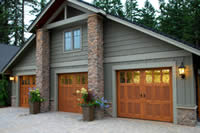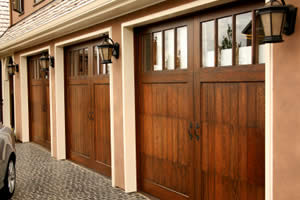“On the up side, wood doors can be designed to match any
home, and custom designs can add substantially to your home’s value.”
 Classic, traditional wooden garage doors can be custom-designed to fit your home’s architectural style and increase your home’s value.
Classic, traditional wooden garage doors can be custom-designed to fit your home’s architectural style and increase your home’s value.
If you are having a hard time deciding, consider the four primary elements of garage door selection:Design, Durability/Reliability, Insulation/Noise Reduction, and Budget. Spend your time considering these four factors, and you will make a great decision.
Design
When it comes to pure design, it’s hard to beat wood. If you can imagine it and put your ideas on paper, even if it’s a simple sketch, your ideas can become reality. The great thing about wooden doors is that you can create the look of a custom, hinged “carriage house” door, but still have the convenience of overhead door operation.
For purists, there are a few garage door manufacturers in the United States that offer custom built, “authentic” carriage doors. Rather than making a sectional door look like an old-style hinged carriage door, some people want the real thing. Contrary to what you might think, there are even automatic door opener options for hinged carriage doors.
Wooden garage doors come in “paint grade” and “stain grade/appearance grade” designs. Paint grade doors typically come pre-primed from the factory with the expectation that every surface will be painted prior to installation.
Stain grade or appearance grade doors are designed and built with wood that should be seen. Properly staining and sealing your door will show off the wood’s natural beauty and will complement the exterior design elements of your home.
Why buy wood? Some homeowner associations might require wooden garage doors. Home renovators, higher end builders and remodelers, owners of historic or classic homes, etc., may not settle for anything less than a real wood door, no matter how good a steel replica may look.
Wooden doors are more like a piece of furniture than an appliance. While custom furniture is typically purchased to complement your home’s interior design, custom wood doors are purchased to complement your home’s exterior design.
Like steel garage doors, there are a number of “stock” designs from most wooden garage door manufacturers. However, there are also garage door manufacturers that will custom design your door – complete with ornamental hardware – to match your taste and your home’s design. If design is critical, there is nothing like a purpose-built wooden door!
Durability/Reliability
Unlike steel garage doors that don’t require much maintenance, wooden garage doors do. The two most common enemies of a wood are sun and moisture. (Note: Your 16-year-old son or daughter should probably be on this list, too, but we will leave that to your imagination).
To keep your wood door in top condition, you need to closely examine it at least once per year. If the paint is cracking or peeling, the damaged area(s) must be scrape, primed and painted. If you discover cracks in the door itself, the crack(s) must be filled with exterior grade caulking, primed and painted. For larger dents, dings or voids in the wood, exterior wood filler must be used to first fill the void, with primer and paint to follow.
If your door is painted, you will generally need to repaint it every one to two years. However, with high quality paint, you will likely be able to repaint about as often as you paint the trim on your home. If your door is stained, you should follow the stain manufacturer’s recommendations for reapplication, while still maintaining the annual inspection regimen.
Keep in mind, when you finish wooden garage doors, every surface must be finished, including the inside, outside, bottom, sides and joints. After perfectly caulking and painting the outside of your door, you may get that puzzled look when you see signs of moisture on the inside. How did that get there? When moisture is in the air, especially in humid and coastal regions, the moisture doesn’t stay outside your door. It will penetrate any unprotected surfaces on wooden garage doors, leaving unsightly stains and shortening the life of your door.
Regardless of the manufacturer or door design, wood doors require more maintenance. The key is to take a close look at your door every year and immediately address any maintenance needs. This will not only ensure the long life of your door, but will also keep you from voiding your door’s warranty if it is still in force. For more information on your specific door, read the care and maintenance instructions provided by your door manufacturer.
Insulation/Noise Reduction
When considering insulated garage doors, wood by it very nature offers better insulation and sound deadening qualities than its steel counterpart. Although insulated wooden garage doors are not as common as insulated steel garage doors, they are available.
Multi-layered wood construction provides a decent R-Value by sandwiching polystyrene insulation between an inner and out layer of wood. If you want a raised panel door or something other than a virtually smooth design, the insulation can still be maintained between layers of wood, with added wood design elements affixed to the outer door skin. Door bottoms are typically sealed against the weather and are finished to keep adverse weather elements outside where they belong.

Custom Carriage Style Garage Doors
Operate Like Standard Overhead Doors
Budget
The price range in wooden garage doors is dramatic. For a simple, tilting solid wood door, you could spend $400-$800, or you could spend $5,000 or more for a custom built, hand finished, hinged carriage house door. You could actually spend upwards of $10,000 if money was no object.
More typically, an installed, paint grade door could cost from $800 to more than $1200, depending on options. If you need (or want) an “appearance grade” door that requires staining (more like custom cabinetry), prices run from $1200-$1500 on the low end, to more than $2000 on the higher end. Keep in mind, “custom” designs push prices well beyond those stated here.
Learn more about garage door prices.
What about warranty?
Because they are more susceptible to deterioration from neglect, wooden garage doors carry much shorter warranties than their steel counterparts. Most steel garage doors come with very good warrantees, from 10 years to a limited lifetime warranty.
By contrast, most wooden garage doors carry limited warranties from one to five years. If wood sections are not properly finished, including the inside, outside, bottom, sides and joints, your warranty will likely be voided. Carefully read your warranty to ensure your door is properly finished.
Conclusion
Buying a wooden garage door may make you the envy of your neighbors, but that comes with a price. On the up side, wood doors can be designed to match any home, and custom designs can add substantially to your home’s value. If you have a historical home that must preserve its heritage, a traditional or contemporary home that requires just the right architectural touch, or you simply want the nicest garage door in the neighborhood, wooden garage doors can’t be beat. The natural insulation and sound deadening qualities of wood are also a benefit, even if you don’t opt for additional, factory-installed insulation.
On the down side, wooden garage doors do require more maintenance. Wood is more susceptible to water intrusion and environmental damage, and requires more frequent painting and/or staining. If left to the elements, warping, cracking and splitting are a foregone conclusion. Bottom line: Annual maintenance inspections are a must.
All in all, when you drive by a beautiful home with a custom-designed wooden garage door, it’s hard to settle for anything less. If properly maintained, you will have to look at your garage door for many years to come. Think hard and choose wisely.
Return from Wooden Garage Doors back to Overhead Garage Door
